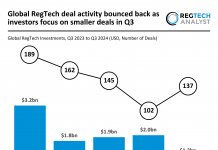Just half (49%) of organisations have sufficient budget to meet their current cybersecurity needs, and 11% and only protect their most critical assets.
These stats come from a new survey from the Neustar International Security Council (NISC).
Despite the existing constraints on budgets, 35% of information technology and security professionals said their organisations cybersecurity budgets are either staying the same or decreasing int 2023. Of these, 44% believe their business will be more exposed and at risk as a result.
The survey asked participants to identify the most significant risks to their organisation’s IT security posture. The top concern was ‘increased sophistication of attacks’, which was cited by 60% of respondents.
This was followed by ‘increased activity of attackers’ (54%), and ‘budget constraints’ and ‘larger attack surface from an increasingly borderless business operation’, which were both cited by 35% of respondents.
The responses also highlight an awareness of cybersecurity needs by the C-suite and board. According to the survey, 83% believe the decision-makers understand the current security threats their business is facing, 81% recognise the importance of having a multi-layered defence strategy, and 80% agree their firm make protecting the organisation an integral part of business operations.
However, 69% of respondents are still concerned current budget constraints are limiting the use of new strategies, technologies and implementation practices.
Another finding of the report is that 85% reported hybrid working has increased their organisation’s reliance on third-party providers. As a result of this, 78% feel this has left the company more exposed.
Distributed denial-of-service (DDoS) attacks were the greatest perceived threats through third-party providers, cited by 22%. This was followed by system compromise (20%) and ransomware (18%).
Respondents see ransomware as the most rising threat (75%), followed by generalised phishing (74%), DDoS attacks (72%), and targeted hacking and social engineering via email (both 71%).
Neustar Security Services senior vice president of solutions Carlos Morales said, “With mounting budget pressures, IT and security teams are once again being asked to do more with less, which will likely accelerate the adoption of service-based offerings that allow enterprises to flexibly scale up resources based on demand.
“While cost may be the driver, technology leaders must carefully consider what value potential service-based offerings can deliver to ensure maximum impact to the organisation and prioritise partners that can deliver best-of-breed technology, professional expertise and word-class service.”
The survey got the responses of senior information technology and security professionals across six EMEA and US markets.
On 21st February, FinTech Global is hosting the fourth annual Financial Services CyberTech Forum. Join the in-person event to get the latest cybersecurity insights from senior decision makers from across the financial services sector.
Copyright © 2023 FinTech Global
Copyright © 2018 RegTech Analyst






